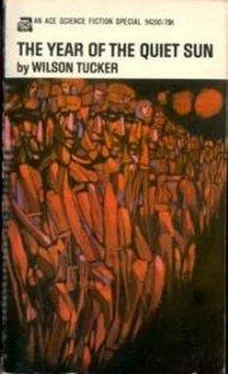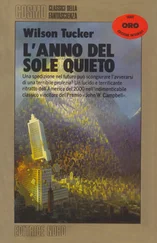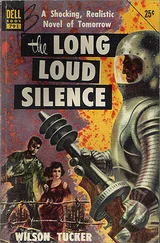Wilson Tucker - The Year of the Quiet Sun
Здесь есть возможность читать онлайн «Wilson Tucker - The Year of the Quiet Sun» весь текст электронной книги совершенно бесплатно (целиком полную версию без сокращений). В некоторых случаях можно слушать аудио, скачать через торрент в формате fb2 и присутствует краткое содержание. Год выпуска: 1970, ISBN: 1970, Издательство: Ace Books, Жанр: Фантастика и фэнтези, на английском языке. Описание произведения, (предисловие) а так же отзывы посетителей доступны на портале библиотеки ЛибКат.
- Название:The Year of the Quiet Sun
- Автор:
- Издательство:Ace Books
- Жанр:
- Год:1970
- ISBN:0-441-94201-6
- Рейтинг книги:3 / 5. Голосов: 1
-
Избранное:Добавить в избранное
- Отзывы:
-
Ваша оценка:
- 60
- 1
- 2
- 3
- 4
- 5
The Year of the Quiet Sun: краткое содержание, описание и аннотация
Предлагаем к чтению аннотацию, описание, краткое содержание или предисловие (зависит от того, что написал сам автор книги «The Year of the Quiet Sun»). Если вы не нашли необходимую информацию о книге — напишите в комментариях, мы постараемся отыскать её.
Won retrospective John W. Campbell Memorial Award in 1976.
Nominated for Nebula Award for Best Novel in 1970.
Nominated for Hugo Award for Best Novel in 1971.
The Year of the Quiet Sun — читать онлайн бесплатно полную книгу (весь текст) целиком
Ниже представлен текст книги, разбитый по страницам. Система сохранения места последней прочитанной страницы, позволяет с удобством читать онлайн бесплатно книгу «The Year of the Quiet Sun», без необходимости каждый раз заново искать на чём Вы остановились. Поставьте закладку, и сможете в любой момент перейти на страницу, на которой закончили чтение.
Интервал:
Закладка:
Here too some of the ceiling lights had burned out, without being replaced. A bank of three monitoring sets occupied a wall bench at his left hand; one of them was blanked out but the remaining two gave him a blurred and unsatisfactory image of the room he had just quit. The vehicle was recognizable only because of its shape and its supporting tank. The two images lacked quality, as though the tubes were aged beyond caring. He turned slowly on the ball of his foot and scanned the room but found nothing to suggest recent occupancy. The tools and equipment were there — and still functioning — but the lab personnel had vanished, leaving nothing but dust and marks in the dust. A yellow bull’s eye on a computer panel stared at him for an intruder.
Saltus put down the recorder and plugged it in.
He said without preamble: “Chaney, the treasure house is empty, deserted — the engineers are gone. Don’t ask me why or where — there’s no sign, no clue, and they didn’t leave notes. I’m in the lab now but there’s nobody here except the mice and me. The door was open, sort of, and I wandered in.” He sipped whiskey, but this time didn’t bother to conceal it from the tape.
“I’m going topside to look for William. Wait for me, Katrina, you lovely wench! Happy birthday, people.”
Saltus pulled the plug from the receptacle, wrapped the cord around the recorder and walked back to the other room to drop the machine into the TDV. To compensate for the added weight, he pulled loose the heavy camera in the nose bubble and threw it overboard after first salvaging the film magazine. He hoped the liaison agent from Washington would cry over the loss. Saltus slammed shut the hatch and left the room.
The corridor ended and a flight of stairs led upward to the operations exit. The painted sign prohibiting the carrying of arms beyond the door had been defaced: a large slash of black paint was smeared from the first sentence to the last, half obliterating the words and voiding the warning.
Saltus noted the time on his watch and fitted the keys into the locks. A bell rang behind him as he pushed open the door. The day was bright with sunshine and snow.
It was five minutes before twelve in the morning. His birthday was only just begun.
An automobile waited for him in the parking lot.
FOURTEEN
Arthur Saltus stepped out warily into the snow. The station appeared to be deserted: nothing moved on any street as far as the eye could see.
His gaze came back to the parked automobile.
It was a small one resembling the German beetle and olive drab in color, but he tardily recognized it as an American make by the name stamped on each hubcap. The car had been there since before the snow: there were no tracks of movement, of betrayal. A thinner coating of snow lay over the hood and roof of the vehicle and one window was open a crack, allowing moisture to seep inside.
Saltus scanned the parking lot, the adjoining flower garden and the frigid empty spaces before him but discovered no moving thing. He held himself rigid, alert, intently watching, listening, and sniffing the wind for signs of life. No one and nothing had left tell-tale prints in the snow, nor sounds nor smells on the wind. When he was satisfied of that, he stepped away from the operations door and eased it shut behind him, making sure it was locked. Rifle up, he inched toward a corner of the lab building and peered around. The company street was trackless and deserted, as were the walks and lawns of the structures across the street. Shrubbery was bent under the weight of snow. His foot struck a covered object when he took a single step away from the protective corner.
He looked down, bent, and picked a radio out of the snow. It had been taken from the stores below.
Saltus turned it over looking for damage but saw none; the instrument bore no marks to suggest it had been struck by gunfire, and after a hesitation he concluded that Moresby had simply dropped it there to be rid of the extra weight. Saltus resumed his patrol, intent on circling the building to make certain he was alone. The sun-bright snow was unmarred all the way around. He was relieved, and paused again to sample the bourbon.
The automobile claimed his attention.
The dash puzzled him: it had an off-on switch instead of the usual key, and but one idiot light; there were no gauges to give useful information on fuel, oil, water temperature, or tire pressures, nor was there a speedometer. Propelled by a sudden exciting idea, Saltus climbed out of the little car and raised the hood. Three large silver-colored storage batteries were lined up against a motor so compact and simple it didn’t appear capable of moving anything, much less an automobile. He dropped the hood and got back into the seat. The switch was flipped to the on position. There was no sound but the idiot light briefly winked at him. Saltus very gently pulled the selector lever to drive position and the car obediently crept forward through the snow toward the empty street. He pushed down on the accelerator with growing exhilaration and deliberately threw the car into a skid on the snow-packed street. It lurched and swung in a giddy manner, then came back under control when Saltus touched the steering wheel. The little automobile was fun.
He followed a familiar route to the barracks where he’d lived with William and the civilian, swinging and dancing from side to side on the slippery surface because the car seemed to obey his every whim. It would spin in a complete circle and come to rest with the nose pointing in the proper direction, it would slide sideways without threatening to topple, it would bite into the snow and leap forward with a minimum of slippage if just one wheel had a decent purchase. He thought that four-wheel-drive electric cars should have been invented a century ago.
Saltus stopped in dismay at the barracks — at the place where the barracks had been. He very nearly missed the site. All the antiquated buildings had burned to their concrete foundations, nearly hiding them from sight. He got out of the car to stare at the remains and at the lonely shadows cast by the winter sun.
Feeling depressed, Saltus drove over to E Street and turned north toward the recreation area.
He parked the car outside the fence surrounding the patio and prowled cautiously through the entranceway to scan the interior. The unmarked snow was reassuring but it did not lull him into a false sense of security. Rifle ready, pausing every few steps to look and listen and smell the wind, Saltus advanced to the tiled rim of the pool and looked down. It was nearly empty, drained of water, and the diving board taken away.
Nearly empty: a half dozen long lumps huddled under the blanket of snow at the bottom, lumps the shape of men. Two GI helmet liners lay nearby, recognizable by their shapes despite the covering snow. A naked, frozen foot protruded through the blanket into the cold sunshine.
Saltus turned away, expelling a breath of bitter disappointment; he wasn’t sure what he had expected after so long a time, but certainly not that — not the bodies of station personnel dumped into an uncovered grave. The GI liners suggested their identities and suggested they had been dumped there by outsiders — by ramjets. Survivors on station would have buried the bodies.
He remembered the beautiful image of Katrina in that pool — Katrina, nearly naked, scantily clad in that lovely, sexy swim suit — and himself chasing after her, wanting the feel of that wet and splendid body under his hands again and again. She had teased him, run away from him, knowing what he was doing but pretending not to be aware: that added to the excitement. And Chaney! The poor out-gunned civilian sat up on the deck and burned with a green, sulphurous envy, wanting to but not daring to. Damn, but that was a day to be remembered!
Читать дальшеИнтервал:
Закладка:
Похожие книги на «The Year of the Quiet Sun»
Представляем Вашему вниманию похожие книги на «The Year of the Quiet Sun» списком для выбора. Мы отобрали схожую по названию и смыслу литературу в надежде предоставить читателям больше вариантов отыскать новые, интересные, ещё непрочитанные произведения.
Обсуждение, отзывы о книге «The Year of the Quiet Sun» и просто собственные мнения читателей. Оставьте ваши комментарии, напишите, что Вы думаете о произведении, его смысле или главных героях. Укажите что конкретно понравилось, а что нет, и почему Вы так считаете.












